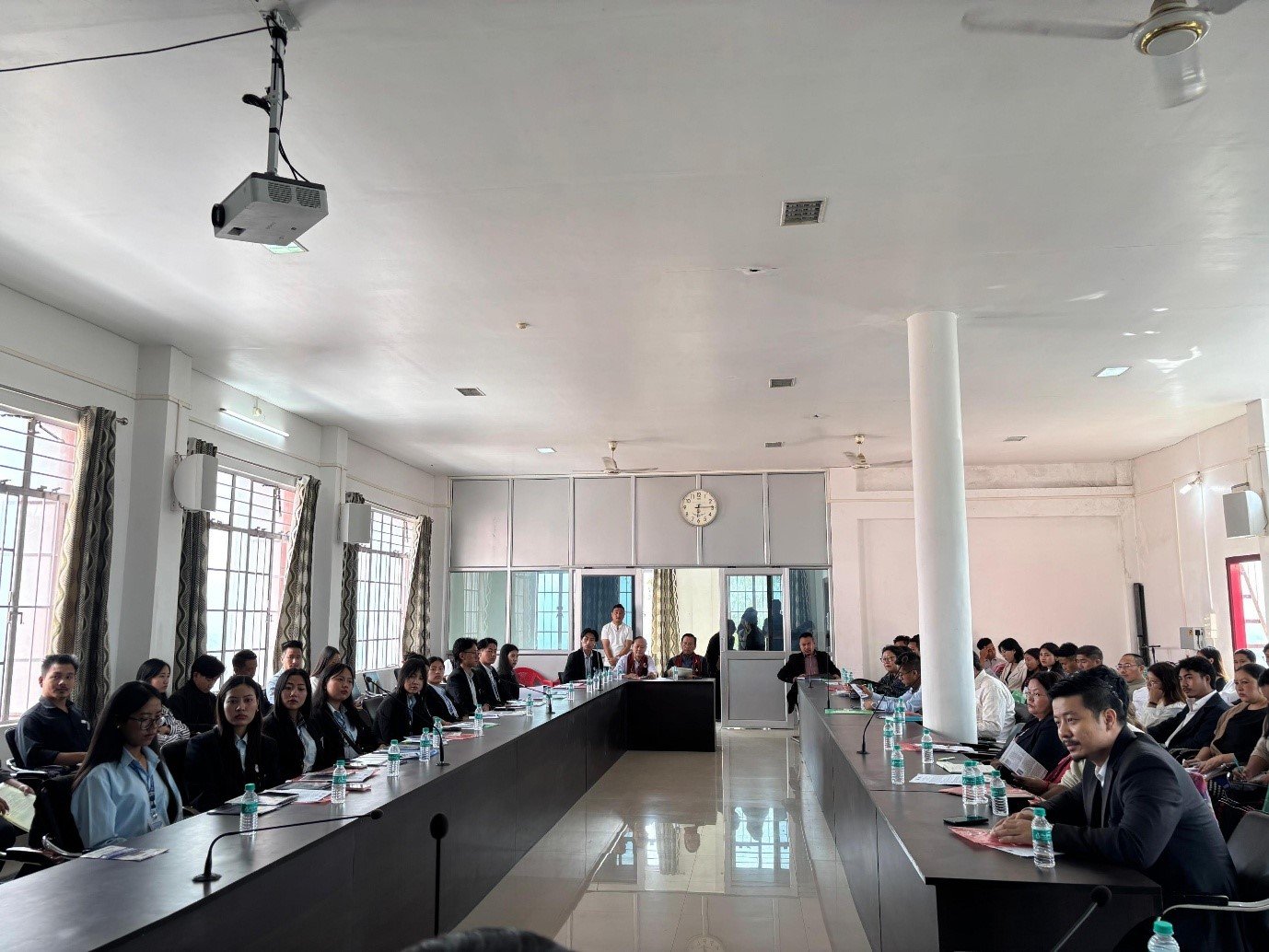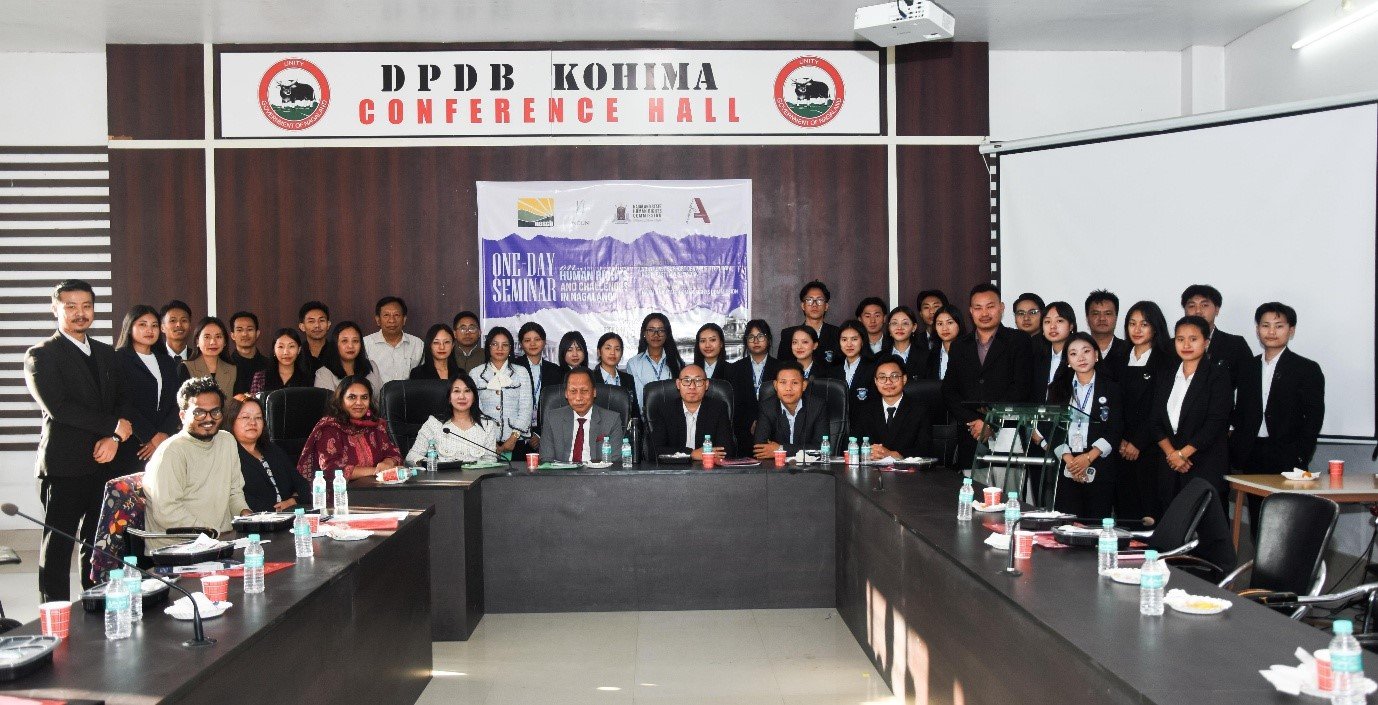The Northeast Support Centre and Helpline- Northeast Law Network in collaboration with the Nagaland State Human Rights Commission organized a “One-day seminar on Human Rights and challenges in Nagaland” on October 25, at DPDB Conference Hall, Kohima, Nagaland.
The conference was attended by leaders of various civil society organizations (CSOs), Students’ Unions, Law students, Students from St. Joseph Autonomous College, Jakhama, and
Avaazein Foundation team from Delhi.
Justice Songkhupchung Serto, Chairman, Nagaland State Human Rights Commission (NSHRC) made an inaugural speech. He shared that Human Rights is the most talked about subject but least visited by the people. He stressed on the genesis of the Universal Declaration of Human Rights and highlighted that the word “All human beings” in Article 1 is largely credited to an Indian woman, Hansa Mehta, for replacing “All men are born free and equal” with “All human beings are born free and equal.” He expressed that respect for each other’s human rights is the foundation of peace, and when we have peace there will be no war which will result in progress and development. He shared that in two years’ time, the NSHRC has looked into the conditions of Medical Hospitals, Public Schools, Public distribution system besides the atrocities in the State and recommended for improvements. Further, the commission has picked up one very important issue of minimum wages where all the States in Northeast have revised the daily wages in three years regularly but Nagaland has not revised it in five years, and therefore, a recommendation has been made to the State Government to revise the same for the welfare of the workers from unorganised sector. The commission has also inquired into the custodial death case in Chümoukedima and recommended Rs. 5 lakhs for the victim’s family and the Govt. have paid, along with recommendations for jail infrastructure upgrades. He also shared that the Commission has recommended for framing of rules under the Organ Transplantation Act, to enable life-saving procedures in the state. He urged the participants to make use of the Commissions and Institutions for redressal of their rights.
Download Nagaland Tribune app on Google Play


Alana Golmei, Advocate, General Secretary, NESCH gave an overview of the Human Rights violations faced by North-East communities in metropolitan cities. She highlighted that despite being Indian citizens, people from the northeast residing in Delhi and other metro cities encounter numerous problems and challenges. These include racial discrimination, harassment, sexual assault, physical assault, murder, sexual harassment at workplace, exploitation, nonpayment of salaries by employers, and discrimination in educational institutions, workplaces, public spaces, and rental accommodations. Many are also lured to cities with false promises of better education or job opportunities, only to end up in the hands of traffickers. She shared that with the intervention of NESCH, some measures are being taken to combat discrimination at different levels.
K. Arkha Achumi, Advocate, NESCH-NELN, Nagaland office, spoke about land acquisition in Nagaland- laws and remedies. He shared that the topic of land rights is gaining prominence in the northeastern states due to the surge of developmental activities. He shared that the Nagaland Land (Requisition and Acquisition) Act, 1965, is the primary state law governing the processes acquiring land for public purposes in Nagaland. The comprehensive Act of the union, Right to Fair Compensation and Transparency in Land Acquisition, Rehabilitation and Resettlement Act, 2013, is yet to be adopted by the State. He lamented that the current state law is largely an adaptation of the pre-independence Land Acquisition Act, 1894, which was criticized for being a colonial-era law that favoured the state and provided meagre compensation. Adopting the 2013 Act would replace this antiquated framework with a modern, pro-people law and would align Nagaland with the rest of the nation on matters of land acquisition, ensuring that its citizens receive just and equitable treatment, significantly higher compensation, and mandatory social security through rehabilitation and resettlement provisions, which are largely absent in the current state law.
S. Pangai Konyak, representative from the victim’s family, narrated a story of Oting incident; a case of extra-judicial killing. He called for truth, justice and recognition of human dignity, asserting that peace cannot exist without justice. He paid a tribute to the victims and pleaded for accountability.
Ato Yim spoke on the role of communities in preserving Indigenous land rights. He emphasized that land for the Nagas is not merely a resource but the very foundation of their identity, heritage, and future. He highlighted that while Article 371(A) and the Inner Line Permit (ILP) provide vital constitutional protection, community awareness and vigilance are equally crucial to safeguard indigenous land rights. Citing recent incidents of illegal migration and proxy ownership, he warned that internal negligence poses as great a threat as external encroachment. He urged village councils, students, and educated citizens to take active responsibility in monitoring land use.
The program was chaired by Abel Ayemi, Advocate, NESCH-NELN, Nagaland office. The seminar concluded with a vote of thanks by Advocate Benison Shohe, Advocate, NESCHNELN, Nagaland office.

